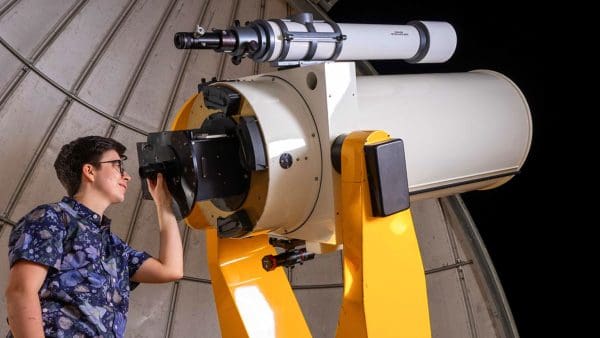
Dyslexia is the most common of all neurocognitive disorders, causing as many as one in five people to have difficulties in learning to read or interpreting letters and words. Junior Ava Powell is well aware of the disorder’s complexity.
“It’s really like a bunch of different disorders wearing a trench coat,” the cognitive science and Writing Seminars major says. “Like other neurological divergences, such as autism and ADHD, dyslexia is on a spectrum. It can be hard to define because it can be so individualized.”
Powell remembers that her younger brother was in third grade before his school realized he was only reading at a kindergarten level and tested him for dyslexia. “That opened my eyes to the obvious need for more support for students with dyslexia,” she says. Empowered by a Woodrow Wilson Fellowship, she is developing a tool to help: a specialized and customizable e-book system to function as a reading coach. She hopes it will allow people with dyslexia to become “agents of their learning,” and maximize their reading potential.
E-book System
The web-based e-book system will operate at many levels. At its most basic, users can customize the font, line spacing, and other aspects of the layout to a level that visually works best for them. “You could also click on any word and it can read the word to them,” Powell says. “I also want to have it so that they could break words down into syllables, and have the system sound out each syllable.”
She’d also like the system to explain a word’s morphology. That could just be a dictionary definition or also involve explaining any prefixes and suffixes. Powell will do her own coding and is learning HTML now while brushing up on Python, a programming language she has some familiarity with. The goal is to have a working prototype by the start of her senior year.
While Wilson Fellowships are usually guided by a student’s major, Powell says her e-book idea helped her choose hers. “I already knew that I liked writing,” she says. “And I was like, hey, what major is related to this project? That’s how I discovered cognitive science.”
Powell hasn’t established how she will formally test her system. She might have her brother play around with it in an unofficial capacity. “I also thought about giving access to the software to an actual classroom teacher and having them give me feedback on how their kids like it,” Powell says. If it comes together as planned, her e-book should make a teacher’s life—and those of students with dyslexia—a little easier.




